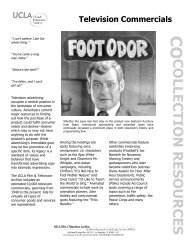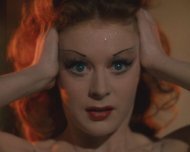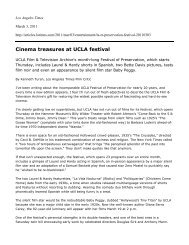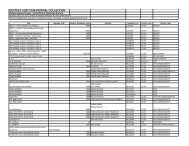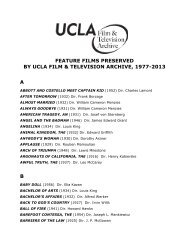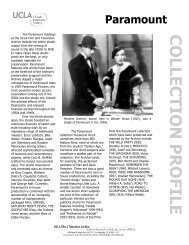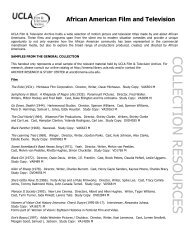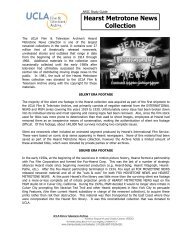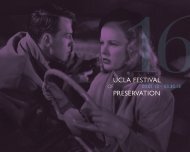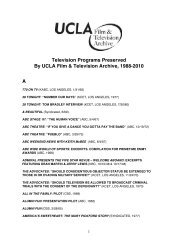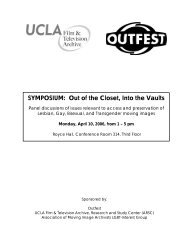"Heroic Grace" catalog - UCLA Film & Television Archive
"Heroic Grace" catalog - UCLA Film & Television Archive
"Heroic Grace" catalog - UCLA Film & Television Archive
Create successful ePaper yourself
Turn your PDF publications into a flip-book with our unique Google optimized e-Paper software.
SATURDAY MARCH 15<br />
THE 36TH CHAMBER OF SHAOLIN [SHAOLIN SANSHILIU FANG]<br />
Hong Kong 1978 Director: Lau Kar-leung<br />
THE 36TH CHAMBER OF SHAOLIN is the most popular screen version of one of the key foundation myths of the kung fu subgenre: the story of the<br />
dissemination of the top-secret combat techniques developed at the Shaolin Temple to the populace at large. An ebullient Lau Kar-fai (Gordon<br />
Liu Jiahui) plays a real-life figure long-since transmuted into legend, a Han Chinese commoner on the run from the Qing Dynasty’s Manchu<br />
oppressors (including a glowering Luo Lie) who seeks refuge at Shaolin. The film’s absorbing account of his initiation into the two-fisted mysteries<br />
takes up a good third of the running time. The Shaolin style is known for its emphasis on the external and the physical, but as depicted<br />
here the training process is very much an inner voyage of discovery: The novice must work his way through a series of torturous “chambers,”<br />
designed to build strength and self-discipline, before winning permission to acquire actual fighting skills.<br />
The newly minted monk, now known as San De (Three Virtues), soon demonstrates the truth of the adage that “the mind is also a muscle”; he<br />
invents a new weapon, the three-section staff, to counter a rival’s “butterfly twin swords” style. In this tradition-bound milieu, however, innovation<br />
is always a dicey proposition: San De is drummed out of the corps when he suggests opening a “36th Chamber” to teach Shaolin techniques<br />
to the masses. Many of the pupils the reluctant apostate acquires in the final reel went on to become famed martial heroes in their own<br />
right. Some of their descendent disciples are still at work today in the Hong Kong movie industry.<br />
—David Chute<br />
Studio: Shaw Brothers. Producers: Run Run Shaw (Shao Cunren), Mona Fong. Screenplay: Ni Kuang. Cinematography: Huang Yuedai. Martial Arts<br />
Directors: Lau Kar-leung (Liu Jialiang), Tang Weizheng. Art Directors: Johnson Cao, Li Yanhai. Editor: Jiang Xinglong. Cast: Lau Kar-fai, Luo Lie, Yu<br />
Yang, Wang Yu, Lau Kar-wing (Liu Jiarong).<br />
35mm, in Mandarin with English subtitles, 115 min.<br />
Print Source: Celestial Pictures Ltd.<br />
© Licensed by Celestial Pictures Ltd. (a company incorporated in Hong Kong SAR). All rights reserved.<br />
LAU KAR-FAI (Gordon Liu Jiahui)<br />
This one-time stuntman and martial arts instructor segued successfully<br />
to the front of the camera in SHAOLIN MARTIAL ARTS (1974). Headliner<br />
status followed two years later in Lau Kar-leung’s CHALLENGE OF THE<br />
MASTERS, but it was the actor’s portrayal of the monk San De in THE<br />
36TH CHAMBER OF SHAOLIN (1978), again under the direction of his adopted<br />
brother, that rocketed him to fame. DIRTY HO (1979) and RETURN TO<br />
THE 36TH CHAMBER (1980) are other noteworthy collaborations between<br />
the two Laus. More recently Lau has branched into television drama. He<br />
is scheduled to appear in Quentin Tarantino’s upcoming KILL BILL.<br />
47



